19 Nights | CONTINENTAL COLLAGE
You will visit the following 18 places:

Ibiza Town
Ibiza (or Eivissa) is a Spanish island in the Mediterranean Sea 79 km off the coast of the city of Valencia in Spain. It is the third largest of the Balearic Islands, an autonomous community of Spain. With Formentera, it is one of the two Pine Islands or Pityuses. Its largest cities are Ibiza Town (a popular stop for many tourists and now a UNESCO World Heritage Site), Santa Eulària des Riu and Sant Antoni de Portmany. It's well-known for the lively nightlife scene in Ibiza Town and Sant Antoni, where major European nightclubs have summer outposts. Well-known nightclubs are Privilege, Amnesia, Space, Pacha, Es Paradís and DC10.
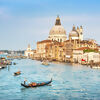
Venice
Venice is a city in northeastern Italy sited on a group of 118 small islands separated by canals and linked by bridges. The city is renowned for the beauty of its setting, its architecture, and its artwork. The city in its entirety is listed as a World Heritage Site, along with its lagoon. Venice has been known as the La Dominante, Serenissima, Queen of the Adriatic, City of Water, City of Masks, City of Bridges, The Floating City, and City of Canals. It has also been described as being one of Europe's most romantic cities. It is truly an amazing, stunning and interesting city for the adventurous to explore!

Pisa
Pisa is a city in central Italy's Tuscany region best known for its iconic Leaning Tower (the bell tower of the city's cathedral). Although Pisa is known worldwide for its leaning tower, the city contains more than 20 other historic churches, several medieval palaces and various bridges across the River Arno. Much of the city's architecture was financed from its history as one of the Italian maritime republics. The city is also home of the University of Pisa, which has a history going back to the 12th century and also has the mythic Napoleonic Scuola Normale Superiore di Pisa and Sant'Anna School of Advanced Studies as the best sanctioned Superior Graduate Schools in Italy.

Zadar
Zadar is a city in Croatia on the Adriatic Sea. It is the centre of Zadar county and the wider northern Dalmatian region. Zadar faces the islands of Ugljan and Pašman, from which it is separated by the narrow Zadar Strait. The promontory on which the old city stands used to be separated from the mainland by a deep moat which has since become a landfill. The harbor, to the north-east of the town, is safe and spacious. Zadar is the seat of a Catholic archbishop.
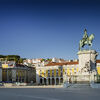
Lisbon
The capital of Portugal, Lisbon (Portuguese: Lisboa) has experienced a renaissance in recent years, with a contemporary culture that is alive and thriving and making its mark in today's Europe. Perched on the edge of the Atlantic Ocean, Lisbon is one of the rare Western European cities that faces the ocean and uses water as an element that defines the city. Lisbon enchants travellers with its white-bleached limestone buildings, intimate alleyways, and an easy-going charm that makes it a popular year-round destination.

Málaga
Málaga is a large city in the southern Spanish region of Andalucia and capital of the Malaga Province. The largest city on the Costa del Sol, Malaga has a typical Mediterranean climate and is also known as the birthplace of famous Spanish artist Pablo Picasso. The city offers beaches, hiking, architectural sites, art museums, excellent shopping and cuisine. While more laid back than Madrid or Barcelona, Malaga is still the center and transport hub for the hugely popular Costa del Sol region, which is flooded with tourists in the summer, and the city has certainly cashed in on the sun and sand, with lots of new construction as well as hotels and facilities geared to tourists. However, Malaga also offers some genuinely interesting historical and cultural attractions in its old city and its setting on the coast is still beautiful.

Marseille
Marseille, known in antiquity as Massalia, is the second largest city in France, after Paris, with a population of 852,395 within its administrative limits on a land area of 240.62 km2. The urban area of Marseille extends beyond the city limits with a population of over 1,420,000 on an area of 1,204 km2. 1,530,000 or 1,601,095 people live in the Marseille metropolitan area. Located on the southeast coast of France on the Mediterranean Sea, Marseille is France's largest commercial port and largest French city on the Mediterranean coast. Marseille is the capital of the Provence-Alpes-Côte d'Azur region, as well as the capital of the Bouches-du-Rhône department. Its inhabitants are called Marseillais.
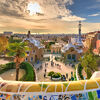
Barcelona
Barcelona – Spain's enchanting capital, second largest and most populous city. It is a huge city that vibrates with life, and there’s certainly not another city in the country to touch it for its sheer style, looks or energy. It is one of the world's leading tourist, economic, trade fair and cultural centers, and its influence in commerce, education, entertainment, media, fashion, science, and the arts all contribute to its status as one of the world's major global cities. Barcelona is home to masterpieces of many great architects – the most famous of which is Antoni Gaudí.

Catania
Catania is an ancient port city on Sicily's east coast. It is the second largest city in Sicily with the metropolitan area reaching one million inhabitants, a major transport hub, economic centre and a university city where you will enjoy a busy downtown and an active nightlife. It is also well known for its particular baroque architecture and urban design (the downtown area is a World Heritage Site, along with all the Val di Noto), consequences of the great earthquake of 1693 after which the city had to be rebuilt, like most of eastern Sicily. Catania has had a long and eventful history, having been founded in the 8th century BC. In 1434, the first university in Sicily was founded in the city. In the 14th century and into the Renaissance period, Catania was one of Italy's most important cultural, artistic and political centres. The city has a rich culture and history, hosting many museums, restaurants, churches, parks and theatres. Catania is well known for its street food.
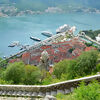
Kotor
Kotor is a coastal town in Montenegro with a population of about 13,500. It is well-known for its World heritage medieval structures (including churches and fortifications) and its stunning natural setting at the very edge of the mountain-rimmed Kotor Bay. It is situated in a most secluded tip of Boka Kotorska bay, in the northern part of the Montenegro coast on the Adriatic Sea. Kotor has developed around Stari Grad (local language for "old town"), the city's old town and best known landmark, which is listed with UNESCO World heritage sites. Kotor Bay is the deepest natural fjord-like bay in the Mediterranean Sea, and the scenery around it (including the steep mountains which come almost straight down to the waters edge) is spectacular.

Portofino

Sorrento
Sorrento Neapolitan: Surriento is a town overlooking the Bay of Naples in Southern Italy. A popular tourist destination, it can be reached easily from Naples and Pompeii as it is at the south-eastern end of the Circumvesuviana rail line. The Sorrentine Peninsula has views of Naples, Vesuvius and the Isle of Capri. The Amalfi Drive, connecting Sorrento and Amalfi, is a narrow road that threads along the high cliffs above the Tyrrhenian Sea.

Koper
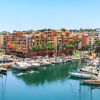
Monte Carlo
Monte Carlo, officially refers to an administrative area of the Principality of Monaco, specifically the ward of Monte Carlo/Spélugues, where the Monte Carlo Casino is located. Monaco has four traditional quarters - from west to east they are: Fontvieille (the newest), Monaco-Ville (the oldest), La Condamine, and Monte Carlo. Monte Carlo (literally "Mount Charles") is situated on a prominent escarpment at the base of the Maritime Alps along the French Riviera. Near the western end of the quarter is the world-famous Place du Casino, the gambling center which has made Monte Carlo "an international byword for the extravagant display and reckless dispersal of wealth". It is also the location of the Hôtel de Paris, the Café de Paris, and the Salle Garnier (the casino theatre which is the home of the Opéra de Monte-Carlo).

Cadiz

Cartagena
Cartagena is a Spanish city and a majornaval station located in the Region of Murcia, by the Mediterranean coast, south-eastern Spain. The metropolitan area of Cartagena, known as Campo de Cartagena, has a population of 409,586 inhabitants. Cartagena has been inhabited for over two millennia, being founded around 227 BC by the Carthaginian Hasdrubal the Fair as Qart Hadasht, the same name as the original city of Carthage. Much of the historical weight of Cartagena in the past goes to its coveted defensive port, one of the most important in the western Mediterranean. As far back as the 16th century it was one of the most important naval ports in Spain, together with Ferrol in the North. It is still an important naval seaport, the main military haven of Spain, and is home to a large naval shipyard. The confluence of civilizations as well as its strategic harbour, together with the rise of the local mining industry is manifested by a unique artistic heritage, with a number of landmarks such as the Roman Theatre, the second largest of the Iberian Peninsulaafter the one in Mérida, an abundance of Phoenician, Roman, Byzantine and Moorish remains, and a plethora of Art Nouveaubuildings, a result of the bourgeoisie from the early 20th century. Cartagena is now established as a major cruise ship destination in the Mediterranean and an emerging cultural focus. It is the first of a number of cities that eventually have been named Cartagena, most notably Cartagena de Indias (Cartagena of the Indies) in Colombia.

Civitavecchia
Civitavecchia is a town and comune of the Metropolitan City of Rome in the central Italian region of Lazio. A sea port on the Tyrrhenian Sea, the name ''Civitavecchia'' means "ancient town". The modern city was built over a pre-existing Etruscan settlement. The massive Forte Michelangelo was first commissioned from Donato Bramante by Pope Julius II, to defend the port of Rome. The upper part of the "maschio" tower, however, was designed by Michelangelo, whose name is generally applied to the fortress. North of the city at Ficoncella are the Terme Taurine baths frequented by Romans and still popular with the Civitavecchiesi. The modern name stems from the common fig plants among the various pools. And also next to the town is the location of the cruise ship docks. All major cruise lines start and end their cruises at this location, and others stop for shore excursion days that allow guests to see Rome and Vatican sights, which are ninety minutes away.
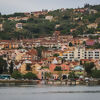
Argostoli
Argostoli is a town and a former municipality on the island of Kefalonia, Ionian Islands, Greece. It has been the capital and administrative centre of Kefalonia since 1757, following a population shift down from the old capital of Agios Georgios (also known as Kastro) to take advantage of the trading opportunities provided by the sheltered bay upon which Argostoli sits. Argostoli developed into one of the busiest ports in Greece, leading to prosperity and growth. The 2011 census recorded a population of 10,633 in the Argostoli municipal unit. Its largest towns are Argostóli (pop. 9,748), Razata (507), Dilináta (496) and Kompothekráta (449).









